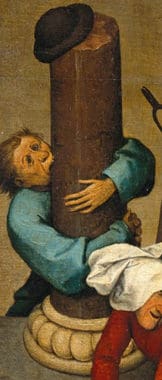“Be courageous; be not puffed up by prosperity nor cast down by adversity. Keep humble in this life so that God may exalt you in the next.” – St. Stephen of Hungary
 Mark 7:1-23: The Pharisees and some of the scribes who had come from Jerusalem gathered round him, and they noticed that some of his disciples were eating with unclean hands, that is, without washing them. For the Pharisees, and the Jews in general, follow the tradition of the elders and never eat without washing their arms as far as the elbow; and on returning from the market place they never eat without first sprinkling themselves. There are also many other observances which have been handed down to them concerning the washing of cups and pots and bronze dishes. So these Pharisees and scribes asked him, ‘Why do your disciples not respect the tradition of the elders but eat their food with unclean hands?’ He answered, ‘It was of you hypocrites that Isaiah so rightly prophesied in this passage of scripture: This people honours me only with lip-service, while their hearts are far from me. The worship they offer me is worthless, the doctrines they teach are only human regulations. You put aside the commandment of God to cling to human traditions.’
Mark 7:1-23: The Pharisees and some of the scribes who had come from Jerusalem gathered round him, and they noticed that some of his disciples were eating with unclean hands, that is, without washing them. For the Pharisees, and the Jews in general, follow the tradition of the elders and never eat without washing their arms as far as the elbow; and on returning from the market place they never eat without first sprinkling themselves. There are also many other observances which have been handed down to them concerning the washing of cups and pots and bronze dishes. So these Pharisees and scribes asked him, ‘Why do your disciples not respect the tradition of the elders but eat their food with unclean hands?’ He answered, ‘It was of you hypocrites that Isaiah so rightly prophesied in this passage of scripture: This people honours me only with lip-service, while their hearts are far from me. The worship they offer me is worthless, the doctrines they teach are only human regulations. You put aside the commandment of God to cling to human traditions.’
And he said to them, ‘How ingeniously you get round the commandment of God in order to preserve your own tradition! For Moses said: Do your duty to your father and your mother, and, Anyone who curses father or mother must be put to death. But you say, If a man says to his father or mother: Anything I have that I might have used to help you is Corban (that is, dedicated to God), then he is forbidden from that moment to do anything for his father or mother. In this way you make God’s word null and void for the sake of your tradition which you have handed down. And you do many other things like this.’
He called the people to him again and said, ‘Listen to me, all of you, and understand. Nothing that goes into a man from outside can make him unclean; it is the things that come out of a man that make him unclean. If anyone has ears to hear, let him listen to this.’ When he had gone back into the house, away from the crowd, his disciples questioned him about the parable. He said to them, ‘Do you not understand either? Can you not see that whatever goes into a man from outside cannot make him unclean, because it does not go into his heart but through his stomach and passes out into the sewer?’ (Thus he pronounced all foods clean.) And he went on, ‘It is what comes out of a man that makes him unclean. For it is from within, from men’s hearts, that evil intentions emerge: fornication, theft, murder, adultery, avarice, malice, deceit, indecency, envy, slander, pride, folly. All these evil things come from within and make a man unclean.’
Christ the Lord Once again Jesus opposes the Pharisees, correcting their distorted doctrine privately and publicly. His confidence in confronting men who had the power to condemn him to death reveals the seriousness of his claims. The people of Israel could not follow both Jesus and the Pharisees; it became clearer by the day that Christ was demanding an undivided allegiance. His teachings were not optional addenda; he called for a total commitment. Such was Jesus then, and so he is now: the Lord, not the Consultant.
Christ the Teacher God wants our hearts. It is quite possible to appear perfectly Christian on the outside – going to Mass, avoiding drunkenness and obviously lewd behavior, saying prayers – while giving in to evil thoughts and entertaining selfish desires over and over again on the inside. That kind of divided life cannot endure for long. Where our hearts are, there our treasure is, as our Lord says elsewhere in the Gospels (cf. Matthew 6:21). We can never be satisfied with merely exterior piety, and we can never consider ourselves superior to others just because our sins are less visible. The heart that loves is never satisfied with how much it can do for its beloved; if we find ourselves smug in our life of faith, like the Pharisees, chances are we’re running low on love.

Christ the Friend Sometimes we forget how frequently and explicitly Jesus spoke of evil and sin. He was (and is) full of mercy, but that’s because we need his mercy. A good friend tells us when we’re in the wrong; only wolves in sheep’s clothing console the sinner in his sin. Because Christ is so demanding with us, because he tells us directly how much we need to change our lives, we can trust that he has our best welfare in mind. He wants to be with us in heaven, so he sternly warns us against everything that could lure us in the opposite direction.
Most of all, however, he wants us to avoid the double life that the Pharisees are living. They are full of selfishness on the inside, even while they appear to be model Jews on the outside. In this passage, Jesus exhorts the Pharisees, showing that he understands perfectly their shrewd tactics for maintaining appearances while simultaneously indulging their inordinate desires – pretending to commit their property to the Temple, for instance, so that while they maintain use of it they still have a good excuse for not letting others benefit from it at their inconvenience. He also exhorts the people under the Pharisee’s leadership. This shows that the temptation to hypocrisy is universal, and dangerous. Mere appearances fail to reach into the soul. True religion has exterior manifestations, certainly, but it flows from the heart, the place where we decide for or against our conscience, for or against God’s will. Our friendship with Christ, and the purpose, strength, and vigor that flows out of that friendship, depends on our inner allegiance to him; looking like goody-two-shoes on the outside can never substitute for that. Jesus doesn’t care what we look like to others; he cares about who we really are.
Christ in My Life Do I pay too much attention to appearances, Lord? I want others to see you in me, and so I want my outward behavior and appearance to reflect the joy, the purpose, and the goodness you’ve put in my heart. Please keep me from falling into vanity – from caring more about what others think than what you think. Take care of my heart, Lord; teach me to love as you love…
How you despised hypocrisy! But Lord, I fall into it every day! I say I am your follower, and yet look at some of the things I say! The criticisms, the double entendres, the tacit condoning of degrading comments…. In so many ways, Lord, I am still so far from the integrity you want for me. Change me, Jesus; teach me to do your will…
I wonder why many of the people around me are so unhappy. Is it because they are seeking fulfillment in mere appearances, in social acceptance, in having the right reputation and possessions? You have taught me the futility of that lifestyle. Give me the courage, wisdom, and love to pass the lesson on…
PS: This is just one of 303 units of Fr. John’s fantastic book The Better Part. To learn more about The Better Part or to purchase in print, Kindle or iPhone editions, click here. Also, please help us get these resources to people who do not have the funds or ability to acquire them by clicking here.
+
Art for this post on Mark 7:1-23: Cover of The Better Part used with permission. To be a pillar-biter: To be a religious hypocrite detail of The Dutch Proverbs, Peter Bruegel the Elder, 1559, PD-US author’s life plus 100 years or less, Wikimedia Commons.


